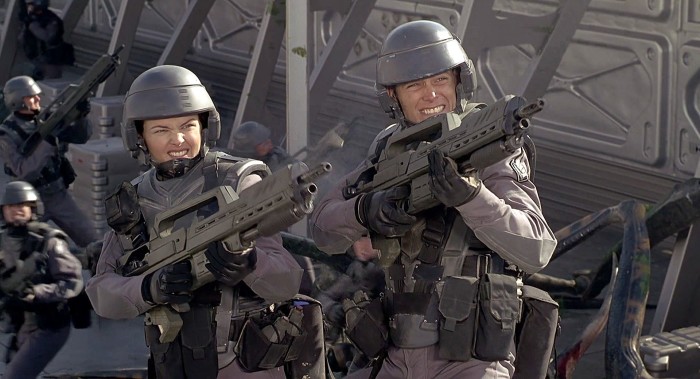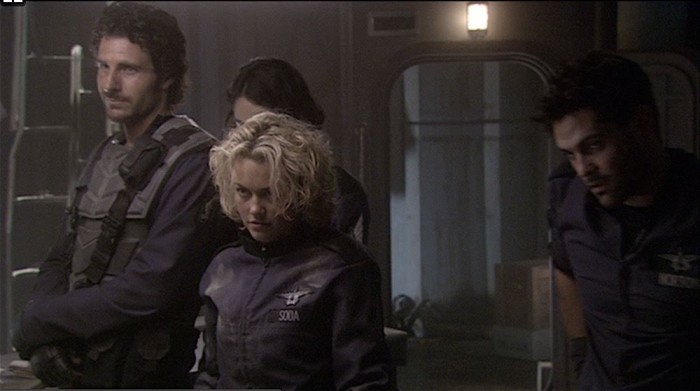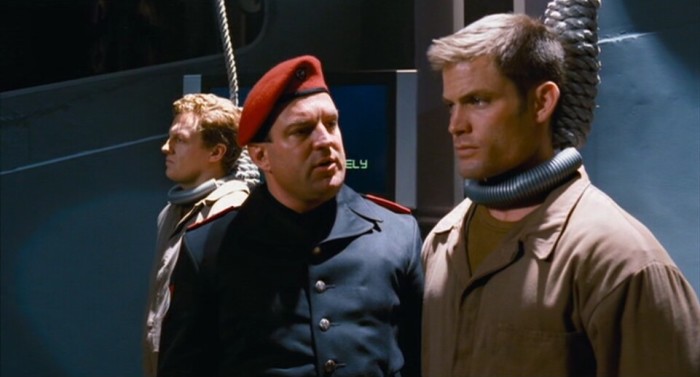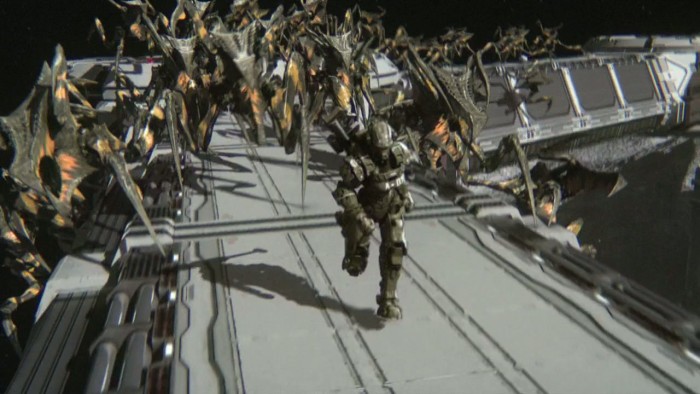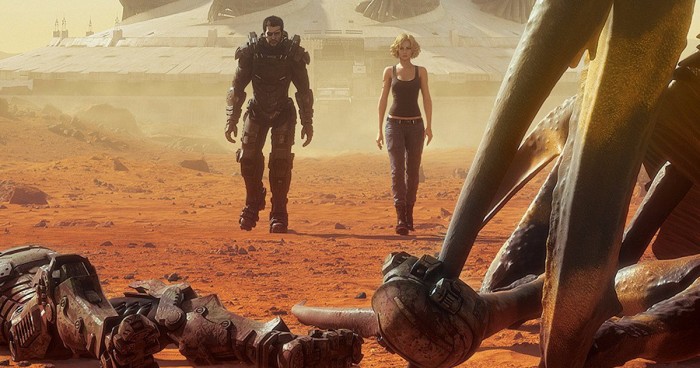'Starship Troopers,' The Unlikely Cult Franchise: Would You Like To Know More?
Depending on how cute you get with your math, there are no less than four separate universes focused upon Robert Heinlein's Starship Troopers. First, of course, came the original novel itself, then the 1997 blockbuster film by Paul Verhoeven. From there, things get a little dicier. There was Roughnecks: The Starship Troopers Chronicles, an animated television series based on Verhoeven's film that ran for two seasons back in 1999 and 2000. Then there's Starship Troopers 2: Hero of the Federation and Starship Troopers 3: Marauder, the live-action and direct-to-video sequels to the 1997 release. Finally, there's Starship Troopers: Invasion, a 2012 release that rebooted the cinematic universe and refusesd to acknowledge the second and third movies. For one of Hollywood's most notorious flops, Starship Troopers has had some pretty long legs in its theatrical afterlife.
Of course, that's not all. This Monday marks the one-night release of Starship Troopers: Traitor of Mars, the latest animated adaption of the original movie. And since some diehard Starship Troopers fans out there might be in desperate need of a franchise refresher, I thought this would be an excellent opportunity to revisit the first four movies – canonical or otherwise — in the Starship Troopers universe.
Some of these films are good, some are not, but their willingness to deconstruct the source material and find a narrative (and genre) that works for them is what makes the Starship Troopers franchise the gift that keeps on giving.
Starship Troopers
Paul Verhoeven's subversive blockbuster classic needs very little defense at this point; the Criterion Collection could add it to its list of upcoming Blu-ray announcements and some of our best and brightest writers would gladly fight to the death over the opportunity to write the essay. Critically and commercially reviled in its day, Starship Troopers has quietly seen the rest of the world catch up to its biting satire. What seemed ludicrous beyond belief in 1997 is now one of the premiere anti-fascism films of our generation, and the current wave of alt-right politics has, incredibly, only made the film's broad displays of xenophobia, jingoism, and fascism seem all-the-more prescient. We tend to celebrate any movie with a little bit of vision as being ahead of its time, but Starship Troopers is a film that has improved a little more with each passing year.
You know the story: Johnny Rico and company sign up to fight in the endless war between humans and Arachnids, and as the human casualties mount, the war effort reaches a frenzied pitch back home. Much has been made of Verhoeven's wondrous Federation Network (FedNet) broadcasts, and they – like the rest of the film – have found their stride with age. Children fighting aggressively for the opportunity to hold a soldier's rifle; public discourse on the morality of the Arachnids shrugged off as bleeding heart liberalism; dehumanization of the enemy that involves destroying even those things that bear a passing resemblance to it (earth insects). The FedNet broadcasts may have seemed ridiculous to the point of lunacy in 1997, but at that point, Fox News was less than a year old. State-approved neocon propaganda was still a relatively new thing for audience members.
What really stands out on subsequent rewatches, however, is how essential the romantic subplot is to the success of the film. Maybe Casper Van Dien and Denise Richards don't exactly have a crackling onscreen chemistry, but their scenes together give Verhoeven's satirical elements the breathing room it needs to remain safely out of the spotlight. As long as Rico, Flores, and Ibanez are playing out their Riverdale melodrama in the midst of an interstellar war, Verhoeven is free to stuff his movie with as much fascist imagery as he wants, secure in the knowledge that the "life-and-death" stakes of his love triangle will always disguise the darker story elements of the movie. As is always the case with the smartest movies, the "worst" parts of Starship Troopers are incredibly calculated.
And while the film's reputation has been repaired on the basis of its intelligence, it's also worth mentioning that Starship Troopers is also one helluva'n action film. The work done by Industrial Light and Magic on the starship models and creature design gives a physical texture to the battlefield; even when Rico's command post is being overrun by thousands of Arachnids, there's still a sense of physicality for viewers that would be frequently forgotten by early CGI modeling in the years to come. Like all the best action movies, Starship Troopers's violence comes as a blend of modeling, prosthetics, and CG; as he did throughout the decade, Verhoeven moves nimbly between genres, giving his action sequences a horror or science fiction bent depending on his mood. This, paradoxically, is what makes the rest of the Starship Troopers franchise such a bizarre mixed bag. Verhoeven was too good to be pinned down to any one genre, so his followers were free to pick and choose from horror, overwrought science fiction, and action depending on their own predilections.
Starship Troopers 2: Hero of the Federation
Given the box office failure of the original film — Starship Troopers only grossed $54.8 million on its domestic release, despite a budget of $105 million — it's sort of a small miracle that Sony Pictures decided to give the franchise another shot. But that's exactly what they did in 2004, releasing Starship Troopers 2: Hero of the Federation on the direct-to-video market with an estimated budget of $7 million and a brand new genre. Whereas Verhoeven's film walked a fine line between absurd military satire and blockbuster action, Phil Tippett's Starship Troopers 2 serves as a straightforward horror film. A group of marines find themselves marooned in a lonely outpost during the middle of a storm; as they dig in and wait to be rescued, a few of the characters begin to realize their comrades-in-arms are not who they seem. Before long, the surviving soldiers realize that the bugs have developed a way to control human bodies, and it's up to a blossoming telepath and veteran POW to ensure the survival of mankind.
Tippett — a VFX supervisor on the first film who had previously worked on films such as Star Wars, Robocop, and Jurassic Park — can't help but draw on his '80s action pedigree, shooting Starship Troopers 2 as a cross between Cameron's Aliens and Carpenter's The Thing. The film's big set pieces take place on the planet's surface, with hordes of alien soldiers surrounding the encampment, but the film really shows signs of life when it sticks inside the compound and focuses on the viral bugs. Detached limbs, gaping gunshot wounds to the head, and explosive death sequences seem to be Tippett's bread and butter, and Starship Troopers 2 works best as a VHS version of blockbuster science fiction/horror hybrids. Starship Troopers 2 even brings back Brenda Strong to play a second character in the Starship Troopers universe; her mobile infantry character is no luckier than her fleet commander, however, ending her own life with a shotgun before the bug inside her mind can fully take over.
Honestly, had the film's producers delivered the same story with no connections to the original film and changed the creatures a bit for legal reasons and named it something vague like The Outpost, Starship Troopers 2 may have earned its own cult fandom. As it stands, the film fails to emerge from the shadow of its predecessor. Whereas Verhoeven's film played its jingoism with an utterly straight face, Starship Troopers 2 is preoccupied with the notion that the first film's anti-war message might've been too subtle for mass audiences. Thus, Starship Troopers 2 takes the concept that war is hell and cranks the knob all the way up to eleven, leaving very little room for nuance or satire in its premise. Take the movie's opening shot. After the obligatory FedNet sequence proudly discussing the accomplishments of the Mobile Infantry — a sequence that ends with the Federation flag waving in the breeze — Starship Troopers 2 immediately transitions to the tattered remains of a similar flag on the battlefield. War, you see, isn't as glamorous as the talking heads would have you believe.
The film also tries to position Richard Burgi's Dax — the titular hero of the Federation — as a tragic figure, a disillusioned veteran who guns down his commanding officer after the latter order Dax's troops to their untimely deaths. In the eyes of the filmmakers, Dax was undoubtedly a refreshing change from the true believers of the original movie; the fact that the Federation co-opts his needless death at the end of the movie for another FedNet recruitment video is supposed to highlight the amoral approach the Federation takes towards its endless war. This, again, shows a misunderstanding of what makes Verhoeven's movie tick. Starship Troopers remains a powerful experience because the tragedy is observed only by the audience. Rico and company end the movie convinced of their own value to the Federation, despite the fact that their very survival has doomed countless youth to follow — and die — in their footsteps. Whatever gains Tippett finds with science fiction and horror, he loses in satire.
Starship Troopers 3: Marauder
Be careful what you wish for, though. If you were let down by the second film's lack of satire, you may find that Sony wildly overcorrected with Starship Troopers 3: Marauder, the highly anticipated return of Caspar van Dien to the Starship Troopers universe. After Edward Neumeier wrote the first and second installments of the franchise, someone at the studio must have decided that he was past due for a turn in the director's chair. Neumeier was given an estimated $20 million dollars (!) and apparently encouraged to go hog-wild for his film. You certainly can't accuse Neumeier of holding anything back: not only did the filmmaker swing the focus back to the beloved Starship Troopers FedNet briefings, he also crammed about four different movies into Starship Troopers 3's brisk 105 minute runtime. Neumeier didn't throw away his shot — instead, he fired randomly in as many different directions as possible, with a few bullets landing somewhere in the ballpark of a decent movie.
Starship Troopers 3 opens on the planet Roku San, where Van Dien's Rico is expecting a visit from the Federation's latest acting Sky Marshal. This particular officer — a telepath and singer-songwriter whose patriotic ballads have gone the Federation's version of double-platinum — is a Christ-like figure for much of the infantry, so when Roku San is overrun by the bug army, Rico and company sacrifice countless lives to ensure that he is escorted off-planet. Then, when the Sky Marshal's shuttle crashes on a bug planet, it is up to Rico and a few of his old friends to launch a clandestine rescue operation before a handful of Federation generals can angle for his position. Sound simple enough? Now throw in the fact that the Sky Marshal has telepathically bonded with a bug Demi-God and is preparing to betray humanity, and the fact that Rico is only sent on the rescue mission because the Federation staged a public execution for his so-called treason, and you'll understand how many different balls Neumeier is trying to keep up in the air here.
Despite the film's unnecessary twists and turns — and somewhere between two and four distinct opening acts — much of the film boils down to a low-budget riff on the original Starship Troopers and a bizarrely religious science fiction film. If it weren't for the frequent dismemberments and beheadings during the film's action sequences, it would be tempting to view Starship Troopers 3 as an oddly ambitious faith film. Most of the characters in the movie are initially resistant to the idea of religion, with the shipwrecked survivors of Roku San arguing vehemently over its place as a superstition in a modern world. It isn't until shit hits the fan that Neumeier begins to ramp up his pro-religious message. In fact, the film slips no fewer than three bits of religious iconography — including a hilariously blatant nod to Michelangelo's The Creation of Adam — into its final minutes, even using a character's newfound beliefs as the basis for a riff on Some Like It Hot. "I got religion, Dix," the female captain tells her fiance after their safe return. "I got it bad." "No one's perfect," Dix responds, and the two kiss passionately as the Federation destroys an entire world in the background.
Unlike Starship Troopers 2: Hero of the Federation, the third film in the franchise doesn't try and veer from the mold, but this somehow makes it even more frustrating than its predecessor. Sure, the film does manage to find its voice for a few brief moments here and there — mostly during the FedNet sequences, which double down on the idea that pacifism is the greatest weakness of the Federation — but too often, the film is little more than a halfhearted attempt to remake the original. And surprisingly, the biggest missed opportunity of all this is Casper Van Dien's willingness to step back into Johnny Rico's boots. Finally cast in a film where he serves as one of the more talented cast members, Van Dien's return to Johnny Rico really isn't half bad: the actor is still a walking, talking action figure, and if anything, an extra decade of wear-and-tear allows him to bark his orders with a bit more authenticity. Van Dien knows exactly the type of film Starship Troopers sets out to be and is more than happy to deliver. If only anyone else could say the same.
Starship Troopers: Invasion
What do you do if two attempts at a live-action Starship Troopers sequel falter on video shelves? Blow the whole damn thing up and start over from the beginning. Ignoring the established canon of Starship Troopers 2 and Starship Troopers 3 — two movies that, to be fair, seem only vaguely aware of each other's existence — Starship Troopers: Invasion starts from scratch, re-booting the franchise as an animated action movie in the vein of countless video game sequences. In this film, Johnny Rico is a high-ranking member of the Federation, Carmen Ibanez is a starship commander looking to find her missing ship, and Carl Jenkins is a psychopath who nearly sacrifices Earth itself in search for telepathically controlled bugs. The main focus, however, is on the crews of the space station Fort Casey and the starship Alesia, who join forces to face off against an Arachnid queen on a suicide mission to Earth.
The big surprise here is the quality of the visuals. Starship Troopers: Invasion was directed by renowned anime filmmaker Shinji Aramaki and, perhaps even more than the original Starship Troopers, is able to deliver the scope and scale of two species caught in an endless war. While the character modeling might seem lifted directly from an early 2000s video game cutscene, there are times in Starship Troopers: Invasion — particularly when multiple starships face off in high atmosphere — that the film achieves a kind of grim beauty. Much like with Starship Troopers 2, we see plenty of Aliens in this adaptation, but also shades of video games like Gears of War, Mass Effect, Dead Space, and, of course, the ever-present Halo franchise. Good luck telling any of the characters' exosuits apart, but when the visuals are at their peak — like an early sequence where a Federation sniper sets up on the exterior of a spaceship — those concerns fade into the background a little bit. Good sound design and quality 3D rendering can cover a multitude of storytelling sins.
And there are plenty of storytelling sins to go around. If the second film errs on the side of horror, while the third film errs on the side of broad satire, then Starship Troopers: Invasion sheds any elements of the original film not connected to excessive violence. Gone are the FedNet sequences, the naive glorification of military service, and the subtle innuendo that humanity might be the ones at fault for this conflict. There's no satirical jabs at the military industrial complex; Starship Troopers: Invasion is pure foxhole camaraderie. We are introduced to a battle-weary group of soldiers who profess their hatred of bugs, continue to fight bugs, and willingly sacrifice their lives so that the men (and women) next to them might live to fight again, all while the gentle sounds of automatic rifles fill the air. Even the few themes that find their way from the other movies — the corrupting power of telepathy and the rapid evolution of the Arachnids in the face of extinction — are little more than window dressing for the next major action sequence. If this is a direct sequel to Starship Troopers, then it's most interested in the Michael Ironside scenes.
Outside of its two-dimensional character work – in every sense of the word – the worst parts of Invasion are when the film attempts to recreate beats from the original movie. From pointless nudity sequences to direct callbacks to the events of Planet P, Invasion seems determined to revisit popular Starship Troopers characters despite the fact that they are no longer the most interesting people in the movie. The frontline story told in Invasion lends itself best to anonymous grunts who die bravely and heroically on the other end of a bug claw, and maneuvering the trio of Starship Trooper standouts into the narrative often feels a little clunky at best. If you're going to cast aside all semblance of continuity, do yourself a favor and clearly decided whether you're all in on the returning cast or the new faces. Pray that these soldiers never run out of bullets, because when the gunfire stops and the talking starts, you'll find yourself reaching for your phone.
Conclusion
All of which brings us to Monday's release of Starship Troopers: Traitor of Mars, another animated movie that promises to continue the adventures of Johnny Rico and his ragtag group of indistinguishable marines. This will be the second time that Casper Van Dien has returned to the franchise after a movie off; despite serving as a producer on Invasion, he didn't bother voicing the character of Johnny Rico, which must set some kind of odd record for the number of times an actor has walked away and then returned to the character that made them famous (hell, at least Sean Connery only came back to the Bond franchise the once). Van Dien is also joined by returning star Dina Meyer, who will somehow repeat her role as the very-dead Dizzy Flores in the latest movie. Ghost? Telepathic residue? Guilt manifesting itself as a psychological hallucination? Whatever the case, expect to add Battlestar: Galactica to the list of science fiction franchises Edward Neumeier unapologetically lifts from for his films.
Whether Traitor of Mars is good, bad, or somewhere in between, it may represent the first time in the history of the franchise that there was some semblance of tonal continuity between films. Watching all four of these movies in short order makes you appreciate the rich textures of Verhoeven's classic all that much more, where a horror movie, an existentialist religious space opera, and a hyper-violent animated movie all still feel torn from the same cloth.
Someday, some brave soul will tackle a remake of Verhoeven's film in earnest; whatever the outcome of that film, know that it cannot possibly measure up to the delightfully unhinged mess that is the Starship Troopers cinematic universe. Good, bad, or somewhere in-between, at least they're movies that take a stab at doing something unique with the source material. I'll consider Starship Troopers: Traitor of Mars a success as long as it does the same.

